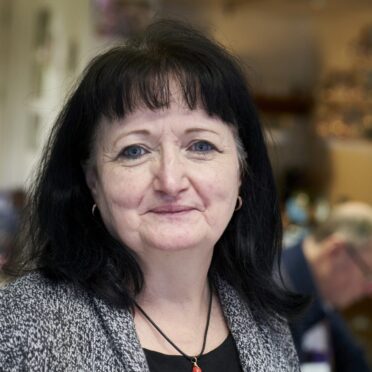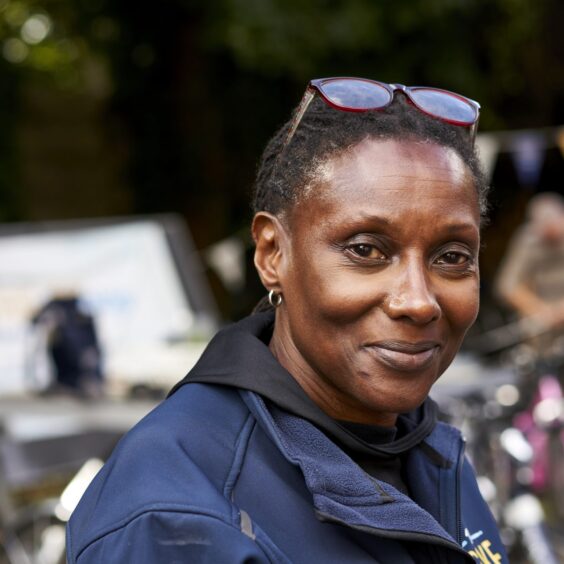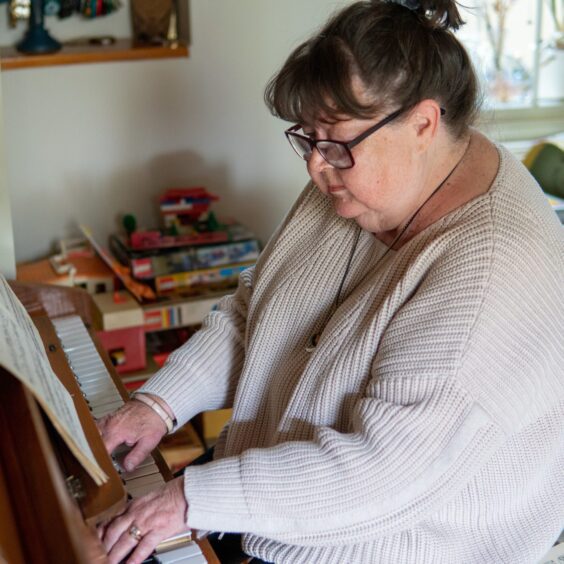When Nancy, mother of two, retired in her sixties, life took an unexpected turn. Her adult daughter was diagnosed with a rare disease and could not find a suitable donor organ.
Some Press and Journal online content is funded by outside parties. The revenue from this helps to sustain our independent news gathering. You will always know if you are reading paid-for material as it will be clearly labelled as “Partnership” on the site and on social media channels. This can take two different forms. This means the content has been paid for and produced by the named advertiser. This means the content has been paid for and approved by the named advertiser but written and edited by our own commercial content team.
“Presented by”
“In partnership with”
She was given just a few months to live and so, gave the guardianship of her children to her mother, Nancy. To make matters worse, this was all during lockdown, and Nancy fell into the gaps of the benefit rules and was refused help from the DWP.
Fortunately, Nancy found the Royal Society for the Support of Women in Scotland, also known as The Society, which was able to cut through the red tape and quickly offer support.
Nancy said: “They gave me a regular monthly grant, and when you’re living on a tight budget, every pound helps.”
But it wasn’t just the financial support given by The Society that helped Nancy get through those hard times.
She said: “It was the advice and the support; it took me from a place of despair to a place where I finally had hope.”
Sadly, Nancy’s story is not unique. Many older women in Scotland find themselves on their own and struggling to live on a low income often with very little if any savings. These financial problems can lead to feelings of loss, loneliness and even make women feel isolated and fearful.
If you or a woman you know is aged 50 or over and struggling through similar circumstances, The Society can help.
Supporting women in need in Scotland since 1847
The Society is a national charity operating throughout Scotland with the purpose of providing financial support to single women over the age of 50 who struggle to live on low income and limited savings.
Founded in 1847 by an Edinburgh solicitor, The Society was put forward as a scheme to help “indigent gentlewomen” of Scottish birth or education.
In 1930, it received a Royal Charter from King George V, and over the years, it has evolved to meet the changing needs of women in Scotland. Over the first 170 years of its operation, The Society is estimated to have given out the equivalent of well over £150 million after adjusting for inflation.
In 2014, the Society’s Patron Her Majesty Queen Elizabeth II, granted a new Royal Charter, and changed The Society’s name to “The Royal Society for the Support of Women of Scotland” (or RSSWS for short).
This new Charter also allows The Society to support a much wider range of women and it now gives out around £1 million each year in direct grants to older women in need.
What kind of support is offered?
Unlike many charities, The Society does not normally provide one-off or single grants for specific items of expenditure. Instead, financial support is provided in the form of a regular monthly grant to top-up the incomes of the women who qualify.
For some women, The Society’s support may be open-ended as long as they meet the criteria. For others, support may be paid for a limited period to support the person over a particular timeframe or with a particular issue.
In 2024/25, The Society’s standard grant is £120 each month.
Most importantly, receiving this support from The Society does NOT affect pensions or benefits. Andrew Tweedy, chief executive of The Society, said: “We know people worry that they might lose their benefits if they get extra help, but that doesn’t apply to our grant because we are a charity. We even have an official letter from the DWP confirming this! You don’t have to be on be on benefits to get our help, but if you are, then don’t let worry about your benefits put you off applying for our help.”
You can learn more about the details of the financial support provided by The Society here.
Could I or someone I know qualify for support?
So, who qualifies for support from The Society?
There is no “typical” beneficiary of The Society. All the women who receive support are individuals with their own circumstances, backgrounds and needs. You could be a kinship-carer looking after your grandchildren or parents, a pensioner, a widow struggling with the mortgage or even living with disabilities that seem to come with age — all that matters is that you qualify.
To be eligible, the applicant must be:
- Age 50 or over
- A woman who has been living in Scotland for at least 2 years
- Struggling to live on a low income and limited savings
Real-life stories of women supported by The Society
The Society supports women from a wide range of backgrounds.
Ms L was 72 and a retired care worker. Her husband died seven years ago and her children and grandchildren all lived in England. She couldn’t afford to see them often. She was born and raised in Glasgow and didn’t want to leave. She wasn’t sure how she could afford to move as she relied on her State Pension and a couple of small private pensions. The Society’s grant helped with the costs of moving and the on-going payments meant that she could afford to visit her family more regularly.
Miss D was 56 and she lived and ran the family croft. She also made jewellery which she sold to visitors to supplement her income. The croft was in a very remote location so a car was essential to her to get around and was the only means of visiting her elderly mother who she needed to visit regularly. The Society’s three-year grant enabled her to keep her car running and provided support while she developed her online jewellery business.
Ms M was 62 years old when she was diagnosed with cancer. While she tried to continue working during treatment, she found she couldn’t manage and was medically retired from work. She did receive a works pension which was topped up by Universal Credit. But she was struggling to get by financially and this compounded her health problems. The Society’s ongoing grant made a difficult situation a bit easier until she received her State Pension when she turned 66.
Ms Q moved to Scotland 25 years ago after she married a man from Dundee. Soon afterwards they had a son who had learning disabilities and Ms Q’s relationship with her husband broke down. Since then, Ms Q has dedicated her life to caring for her son on a full-time basis. He continued to live at home but Ms Q’s benefits reduced significantly when he left school. The Society’s ongoing grant reduced some of the financial pressures on her and enabled her to continue her exercise classes at the gym which she described as being her only “me time” in the week.
Apply now
If you or someone you know qualifies for support or if you simply want to learn more, visit The Society’s website and apply today.
Want to get involved in the North and the North East? The Society is now recruiting
If you’re feeling inspired and want to join the campaign to support women in Scotland, now is the time to get involved.
The Society is recruiting for the role of a part-time caseworker to cover the Angus, Grampian, Highlands & Islands areas.
Andrew Tweedy said: “We are recruiting for a post because our existing caseworker, Lucy McRitchie, is retiring. Lucy joined the Society in 2018 and has done an amazing job ever since. She is one of a kind! Everyone connected with the Society will miss Lucy enormously and we all wish her the very for her retirement. She leaves big shoes to fill, and we are now looking for an exceptional candidate who can do so! The closing date for applications is 3rd March.”
Learn more and see if you’re the perfect fit for the role today.



Conversation